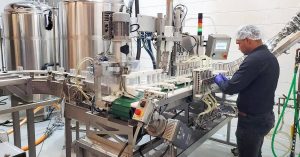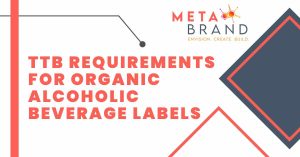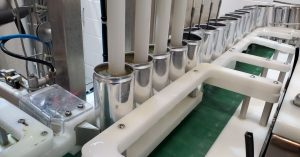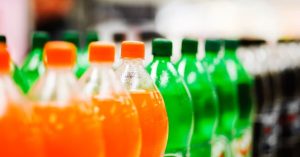Imagine walking down the supermarket aisle, your eyes skimming over a sea of products. Amidst this ocean, one label catches your eye – non-GMO certification. What does it mean and is it significant?
In today’s world where our food comes not just from farms but from laboratories too, knowing what you’re eating has become more crucial than ever. Non-GMO certification plays an essential role in this understanding.
Obtaining certifications, like the Non-GMO certification or even the Halal certification, can be a difficult process without guidance from leading experts.
This post is about to take you on a journey through the complex landscape of non-GMO certification – unveiling its meaning, importance, and how it influences everything from beverage labels to supply chain optimization.
Understanding Non-GMO Certification
The non-GMO certification process can be a complex beast to understand, but let’s break it down into digestible bites. Determining if GMOs have been utilized in the creation of a product, such as food or drink, is an integral part of the non-GMO certification process.
In the simplest terms, a Non-GMO Project Verified seal is like your best friend telling you no nasty surprises are lurking inside that beverage bottle. No sneaky modified genes or genetic engineering involved.
The Need for Transparency
We’re seeing more and more people leaning away from GM foods because they don’t feel confident about what these could mean for their health – think Frankenstein veggies. It’s not just hearsay; over 50,000 products have now gone through the Non-GMO Verification Process.
Gone are the days when consumers were clueless about what went into their drinks and foodstuffs. Today’s customers demand transparency – it’s almost like they’ve turned detectives overnight.
A Clear Label
You may wonder why labels matter so much. Well consider this – you’re at a grocery store with only five seconds to make up your mind on which energy drink to pick up off the shelf. What will catch the light and draw your attention?
Your answer would probably be something along the lines of clear labeling indicating “non-gmo”. These three simple words represent integrity in ingredient sourcing and act as an assurance against any hidden use of genetically engineered ingredients.
Implications for Beverage Production
Sourcing high-quality non-GMO ingredients isn’t just about ticking a box for certification, it’s about raising the bar on quality. After all, why settle for standard when you can have premium? It’s like choosing to dine at a fancy restaurant over grabbing fast food – the difference is palpable.
Quality assurance testing plays a crucial role in this path towards non-GMO certification. It’s not just about paperwork; it calls for thorough examination and double-checking to make sure our drinks meet the standards.
Key Takeaway:
This isn’t a maze of complexities but an assurance that no sneaky GMOs lurk in your beverage. As consumers turn detectives, transparency is key. Clear “non-gmo” labels are beacons of trust and ingredient integrity.
High-quality non-GM ingredients aren’t just about certification, it’s upping the quality game – like choosing fine dining over fast food. It demands rigorous testing to make sure our drinks meet these premium standards.
The Non-GMO Project Certification
Let’s take a deeper look at the Non-GMO Project, its standards, and the verification process. These factors play a crucial role in our food industry, particularly for those who prioritize non-genetically modified organisms (GMO) products.
The Rising Case Against GMOs
Globally, public concern about genetically engineered foods is growing. Consumer awareness of the potential health and environmental impacts associated with their food choices is on the rise.
This increasing awareness has led to an impressive demand for certified products. As a key stat shows us, over 50,000 products have already gone through the Non-GMO Verification Process.
These figures demonstrate the extent to which people are taking into account what they eat. The seal provided by this certification gives them peace of mind that they’re consuming natural goods free from genetic modification.
A Demand for Non-GMO Labeling
Customers aren’t just asking for non-GMO options—they want clear labeling too. Most shoppers today actively seek out labels like “non-gmo project verified” before deciding on purchases.
Certification seals don’t only serve as marketing tools but also validate label claims made by companies about their product’s composition—whether or not they contain any genetically modified organism (GMO).
However, obtaining such validation is no simple task. Each ingredient must undergo rigorous testing based on strict guidelines established by organizations like FoodChain ID, a prominent technical administrator in North America for product verification programs. These tests are necessary to ensure that the ingredients comply with legal limits regarding genetically modified organism (GMO) content.
So why does all this matter? It matters because your favorite energy drink or exotic tea blend could be affected by these standards. The Non-GMO Project’s certification has a profound impact on the food and beverage industry, affecting everything from brewing materials to specialty ingredients.
Key Takeaway:
Non-GMO Project Certification is key for those prioritizing non-genetically modified foods. With growing global concern over GMOs, the demand for certified products has soared—over 50,000 have undergone non-GMO verification.
Consumers not only want these options but clear labeling too. So next time you’re shopping, look out for that ‘non-gmo project verified’ seal—it’s your ticket to more conscious consumption.
The Non-GMO Certification Process Explained
The Non-GMO certification process is a structured sequence of steps designed to ensure that products adhere to non-GMO standards. Here’s how it typically unfolds:
1. Initial Application
Companies seeking certification start by submitting an application. This document outlines key details about the company, including its products and manufacturing methods, setting the foundation for the review process.
2. Comprehensive Documentation
Once the application is submitted, companies must provide thorough documentation. This includes ingredient lists, production records, and testing results. Additionally, companies should offer detailed information regarding their ingredient supply chains, giving certifiers a complete understanding of their operations.
3. Laboratory Testing
Products are often subjected to rigorous testing by accredited third-party laboratories. These tests aim to identify any presence of GMOs and are crucial for backing up the documentation submitted earlier.
4. Detailed Verification
Upon receiving test results, certifiers meticulously review them alongside the submitted documents. This critical analysis determines whether the products truly meet the non-GMO standards.
5. Sustained Compliance
Certification isn’t a one-time event but an ongoing responsibility. Companies must consistently adhere to non-GMO standards through regular updates in documentation, routine testing, and occasional audits to ensure continued compliance and retain their certification status.
By adhering to these steps, companies can demonstrate their commitment to providing non-GMO products to consumers, ensuring both transparency and trust.
Beverage Labeling and Non-GMO Certification
Understanding the impact of non-GMO certification on beverage labeling is essential for any company in the food industry. Customers are more aware of health, so products with a non-GMO label have an advantage over those without it.
Increase Product Recognition with Unique Beverage Label Design
A unique beverage label design, coupled with a recognized standard like non-GMO certification, can significantly enhance product recognition. It’s all about capturing customer attention within five seconds – because that’s all it takes to make an impression.
Gaining this coveted recognition isn’t just about aesthetics; it also involves transparency in your GMO labeling practices. Clearly stating if your drink uses genetically modified organism ingredients or not builds trust and boosts credibility among consumers.
Understand Legal Labeling and Packaging Requirements for Beverages
The legal requirements surrounding product labels are another critical factor to consider when aiming for top-notch beverage label designs. One such requirement is adherence to regulations stipulated by entities like TTB.gov, which covers aspects ranging from alcohol ingredients disclosure to claims made on packaging elements.
To further complicate matters, different countries require specific legal procedures before certifying products as “non-GMO.” But no need to worry. By staying on top of these ever-shifting regulations, you’ll be able to traverse the complicated terrain of international food safety standards.
With innovative packaging acting as one of today’s leading tools used by brands worldwide seeking to influence customer decisions effectively, it pays off big time when businesses take their commitment seriously toward providing clear and honest information.
At the end of the day, navigating through non-GMO certification and understanding its influence on beverage labeling isn’t a walk in the park. But it’s worth it when you see your product flying off shelves into customers’ hands because they trust what’s inside – thanks to your clear, compliant labels.
Key Takeaway:
Grasping non-GMO certification’s impact on beverage labeling is key in today’s health-conscious market. It not only boosts product recognition but also builds trust with customers when you’re transparent about GMO practices. Complying with ever-changing legal requirements for labels might be challenging, but it pays off as clear and honest information leads to products flying off the shelves.
The Theory of Non-GMO Certification for Beverage Production
Understanding the theory behind non-GMO certification in beverage production starts with recognizing what ‘non-GMO’ means. It’s a term that has gained significant traction within food and drink circles, especially given millennials and younger adults are more inclined to believe GM foods are worse for health than non-GM options. But why?
In essence, it relates to how certain ingredients have been sourced or grown. In this context, a genetically modified organism (GMO) refers to an ingredient whose genetic material has been altered through genetic engineering methods. The rising popularity of non-GMO-certified products indicates consumer preference towards naturally occurring ingredients.
Sourcing the Best Ingredients
To create beverages worthy of being called “Non-GMO”, it’s crucial to start with high-quality components. That means sourcing from suppliers who can provide assurance their products haven’t undergone any form of genetic modification.
These might include anything from brewing materials for alcoholic drinks, energy drink specialty ingredients, or even natural flavorings used across a wide variety of refreshments. Producers need assurances these elements meet specific legal requirements about their natural status.
Quality Assurance Testing
Making sure your beverage ticks all the right boxes doesn’t end with sourcing good quality inputs though – there is also rigorous testing involved as part of the product verification program run by organizations like FoodChain ID.
This involves careful examination against set threshold levels during various stages such as processing aids selection and packaging elements usage – not just merely checking if they contain any known genetically engineered substances but also assessing whether there’s potential contamination along supply chain processes.
The supply chain must be clear and trackable, requiring close inspection. This kind of detailed testing ensures that products meet non-GMO standards and can bear the label claims proudly.
The future of food is projected to be increasingly non-GMO, with growth in this sector expected at a compound annual rate of 16.23% from 2017 to 2023. In such an evolving market landscape, understanding the theory behind Non-GMO certification is key for any beverage producer looking to stay ahead.
Key Takeaway:
Understanding non-GMO certification starts with recognizing the importance of natural, unmodified ingredients in beverages. Sourcing top-notch components and ensuring rigorous testing for quality assurance are vital steps. With consumer preference shifting towards these products, understanding this concept is crucial for beverage producers aiming to stay ahead.
The Practice of Non-GMO Certification for Beverage Production
Acquiring non-GMO certification is a meticulous process that needs strategic planning and precise execution. The journey starts with pilot production, which serves as the testing ground for perfecting your beverage formulation.
Pilot Production
Pilot production plays an instrumental role in obtaining non-GMO certification. It’s during this phase where you experiment with various combinations of ingredients to create a unique blend while ensuring it meets the Non-GMO Project’s standard.
Incorporating high-quality specialty ingredients sourced from verified suppliers can enhance the credibility of your product verification claim. However, remember not all non-GMO certified products are created equal. For instance, some beverages may contain animal feed derived from genetically modified organisms (GMOs), which could be a red flag for strict vegetarians or vegans.
Apart from using non-genetically engineered materials and processing aids, keeping track of each step in your supply chain optimization is crucial to avoid any potential cross-contamination with GMO elements. “Every ingredient matters.” should be your mantra throughout this phase.
Supply Chain Optimization
Your work doesn’t stop at brewing up an enticing energy drink or designing catchy labels utilizing sunlight inks that capture light just right; optimizing your supply chain ensures transparency and compliance every step along the way towards achieving Non-GMO Project Verification status.
You need to maintain stringent quality assurance testing protocols at every stage – right from sourcing raw materials like alcohol ingredients down to packaging elements used on the final product. Having systems designed specifically around meeting threshold levels set by regulatory bodies helps assure consumers about their safety standards.
Food items that are free of genetically modified organisms and disclose their components. This trend, driven by a heightened concern for health and the environment, underscores the importance of obtaining non-GMO certification for businesses looking to gain an edge in today’s competitive food market.
Key Takeaway:
Securing non-GMO certification for your beverage production is a detailed journey, starting from pilot production where you experiment with ingredient combinations. Remember, all ingredients count and should be sourced responsibly to avoid GMO cross-contamination.
But it’s not just about creating the drink – optimizing your supply chain ensures transparency and compliance at every step. With quality assurance protocols in place from sourcing raw materials to packaging, you’ll stand out in a competitive market driven by health-conscious consumers.
A Final Word About Non-GMO Certification
Non-GMO certification is more than just a label – it’s about quality assurance, legal compliance, and most importantly, consumer trust. Sourcing high-quality non-GMO ingredients isn’t enough. Rigorous testing plans ensure that your beverage meets the stringent standards of non-GMO project verification.
Beverage labels are more than mere aesthetics. They carry weighty information such as non-GMO status which can enhance product recognition and drive customer decisions.
The path to getting certified involves strategic planning from pilot production to supply chain optimization – all designed for sustainability and transparency in the food industry. To learn more or to work with a reputable beverage manufacturer, contact MetaBrand.












